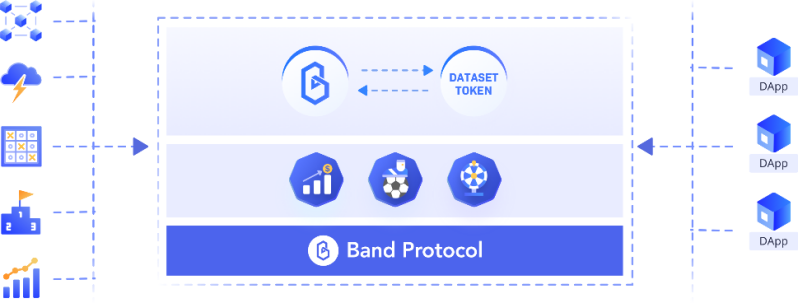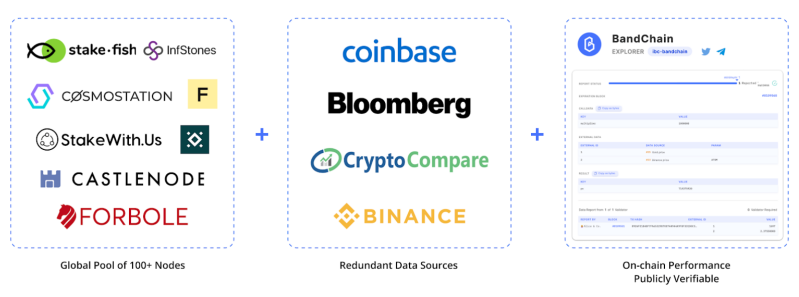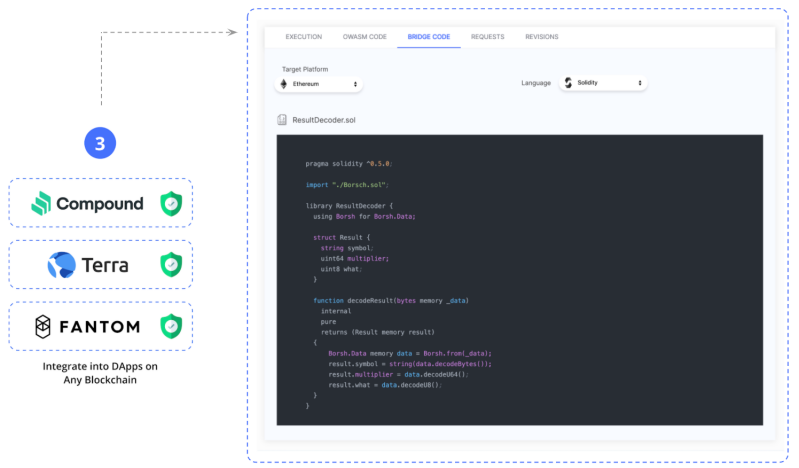
The Band protocol is a cross-chain data platform that brings together real-time data and APIs and connects them to smart contracts. Band mainly focuses on Decentralized Finance (DeFi).
What is the Band blockchain?
Band's network is designed to handle and process the most intensive tasks. Examples include retrieving data from external sources and aggregating platforms that can run smart contracts. Band can modularize tasks and transfer them to its own blockchain. This prevents Band from overloading tasks or causing high transaction costs on the receiving party's network. The data that is sent or modularized is packaged, used and verified across multiple blockchains.
Because Band has a flexible design, developers can query any data, including on-chain data (On-chain data includes the information of all occurred transactions on a certain Blockchain network - or put differently - all information written on the blocks of a Blockchain. In case of a public Blockchain, this information is available for everyone to see). Think of the amount of crypto, transaction data, sports results, weather reports and all other data on the Internet such as stock prices. All this information can be retrieved by Band.
''Band Protocol Ensures Interoperability between Smart Contracts and the Rest of the World''.
''BandChain Oracle solution acts as a middle layer operating between the smart contracts platforms or decentralized applications and the various data providers. The oracles' task is to 1) handle data requests coming from the dApps, 2) query the data from the corresponding providers, and 3) report the results back to the application.''
This is in a nutshell what the Band protocol actually is. Band is an oracle. A blockchain protocol that can retrieve information outside of the blockchain for use on the blockchain.
Why do we need Oracles?
Smart contracts are incredibly wonderful inventions and definitely has a future. Smart contracts are also transparent because of the blockchain. But the use of smart contracts (use cases) have been limited to date due to the fact that no information from outside the smart contracts can be used. This limits the use of the smart contract. Most blockchains are focused on their own network and the world is basically ignored.
Smart contracts did not have interoperability with information residing on the Internet. There have been many attempts to address this problem, but there are still many common problems:
Centralization
Existing solutions such as API feeds, are all centralized today. This is at odds with the blockchain because the blockchain is a decentralized network and not centralized. There is no need to rely on a central organization. A central organization that can control everything can lead to data manipulation and failure. This not only has far-reaching consequences for the end user, but also for all developers and services provided by the network.
Network congestion/scalability
Many platforms suffer from scalability on the network. Band is trying to put an end to this.
How does BandChain Oracle work?
The BandChain oracle should solve the above problems. In addition, this protocol should be able to use the information from outside the blockchain on the blockchain. This oracle works between the smart contracts platforms (Dapps) and on the other hand the data providers. Roughly speaking, the oracles have three tasks:
- Handle data requests from dApps;
- Retrieve data from the providers;
- Reporting results to the applications.
Decentralization
Bandchain is managed by an international pool of validators. The performance and certain actions of these validators can be monitored and verified by anyone. This is due to the transparent network. If a data request is made, the validators are responsible for retrieving the information.
The second layer becomes visible when we talk about reporting the results. This is because the validators retrieve all kinds of information from different sources. So there is no single central authority!
''Bandchain Oracle is decentralized through the introduction of maximum redundancy on two separate layers in the infrastructure design: BandChain validators (consensus level) and data source level.''
Flexibility
Band's Oracle scripts provide maximum customization and flexibility so that users can query and calculate the desired data. The validators get their data from this primary source, where the Oracle script specifies three things:
- The set of data resources, from which the validators will retrieve their data;
- The method of aggregating the result from the resources into the final result.
- The programming languages are diverse and are similar to the well-known smart contracts.
''Our data source scripts and oracle scripts allow maximum customization and flexibility for the user to query and compute their desired data feed.''
''Data sources are the most fundamental unit in BandChain's oracle system. It specifies the primary source from which BandChain's validators will retrieve data. Here users can freely select where the data sources come from.''
Scalability
Thus, the Band protocol is specifically designed to retrieve information from Oracle data (information from outside the blockchain into the blockchain). The blockchain time (time to verify a transaction) is only about three seconds on average, which is fast compared to Ethereum (ETH) and Bitcoin (BTC), which have blockchain times of approximately 15 and 10 minutes, respectively.
''Unlike general-purpose blockchains, BandChain is designed explicitly for oracle data request and computation. This is reflected in the benefits it provides.
For one, an average block time of only 3 seconds, compared to Ethereum's 10-15 and Bitcoin's 10 minutes, means that data request transactions are both received and resolved very quickly.''
Cost
Band Oracle is easy to operate, with the cost per request being attractive to users. Request refers to requesting information from outside the blockchain.
''Finally, there's the issue of cost. Band's oracle allows anyone looking to request data to do so only when they need to and pay the associated fees on a per-request basis. This is significantly more economical than having to, say, update the price of an entire set of assets when in fact, you might currently only need the latest price of one.''
Want to read more about the Band protocol Oracle? Click here!







Reactie plaatsen
Reacties